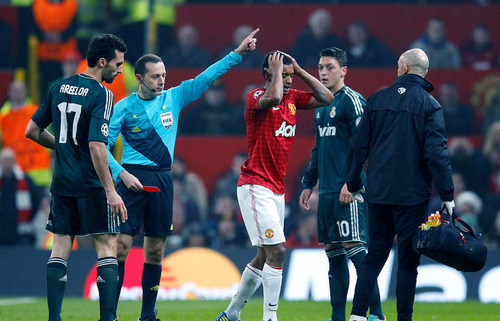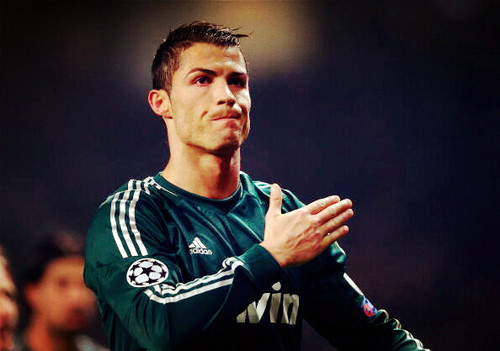On United’s collapse and the difference between losing and losing it
On United’s collapse and the difference between losing and losing it


Sir Alex Ferguson lost it. He saw the red card and charged like a bull. He slammed the seat in front of him, pushing a team official out of his way to reach the touchline, looking this way and that, as if searching for an answer. There were none. In a seemingly innocuous attempt to cushion the ball floating over him, Nani collided with Real Madrid’s Alvaro Arbeloa and caught him with his cleat. He was sent off.
Just minutes before, Manchester United enjoyed the product of Nani’s labour. The winger picked up the ball inside the box and sent it inward, where Madrid’s Sergio Ramos knocked it into his own goal. All the risks Ferguson took looked justified. Wayne Rooney was sitting on the bench, but the manager’s functional players had followed his orders: they sat back, gifted Madrid the ball and struck on the counter with seething pace.
United were beating their opponent at their own damn game.
And then it all fell apart. The dismissal of Nani, whether it was right or wrong or misunderstood or calculated — Turkish referee Cuneyt Cakir had a good couple of minutes to deliberate his verdict, and brandished his red card almost out of nowhere — forever took the protagonist’s role in the game. It robbed the game of its purity. It conjured questions in a game that had been such a wonderful display of football. The defending was masterful. The play was quick. The game was open, a chess board with all its pieces cast in strategic places by each of its players, Ferguson and his friend Jose Mourinho. Ferguson was winning.
Then an undue interruption: in the form of Nani, the pride and wind and the concentration that got United this far in the game left the match. Ferguson barked at the fourth official, who just told him to calm down. And he did. He drew that familiar scowl on his face, while chewing his gum ever so fiercely, and gestured to the crowd. Come on! Come on! Get behind our lads, Ferguson said with his hands, fluttering in front of his choir of 74,959 at Old Trafford on Tuesday. He looked like he wanted to channel everyone’s frustration and concentrate that energy on the greater good: winning it.
But that wish wasn’t granted.
Mourinho put Luka Modric on the field, and United gave up ground. This time it was different: United’s defenders backed away from the challenge, unsure of themselves. They let Modric rifle a curling shot into the net, and then they let Mesut Oezil dance and flick the ball as he pleased in the box. Gonzalo Higuain shot across the goal and Cristiano Ronaldo, sliding on the turf, guided the ball into the net. Within a 13-minute span, United dropped their guard and didn’t seem to care. They looked like a winded bunch. They spent too much time arguing and not enough of it defending, as they had done brilliantly before. United spent the last 10 minutes of the game galloping, pushing forward, peppering Madrid’s stand-in goalkeeper, Diego Lopez, with shots from different angles. Diving, sprinting, reacting: the Spaniard had to do it all. Life did, after all, exist in the legs and hearts and minds of these players of United. They just realized that struggle, that spirit, their will to fight another day too late. Madrid won, 3-2 on aggregate.
And then the Red Devils picked up their pitchforks and shouted in the referee’s face, applauded sarcastically, really made much ado about a lost cause they did little to effect. Instead of rallying around the dubious red card, United blamed everything on it. The hands trembled. Struggling for words, Ferguson could only muster the movement of his finger, pointing at Cakir with fury. He skipped the post-match press conference, not “fit,” said assistant manager Mike Phelan, to talk with the media or even the club’s own MUTV. The dressing room was “distraught,” surely angry and upset, defeated and blue.
United are not the first team to feel hard-done by. They are not the first to cry foul. And they are not the first to unite in the face of adversity, as they have done so often in the past. Just not this time. They’ve thrived off the fight, revelled in it, but they didn’t put one up. The fire within them burned for so long — in Madrid, too, as they battled to a 1-1 draw three weeks ago — only for the flame to fizzle out during 13 crucial minutes of play between the dismissal and the game-winning goal.
But the world, as Mourinho said, was never going to come to an end. That a red card featured so prominently in the result of the match the world sat and watched was but a convenient talking point, and a misleading one, too. “The best team lost,” Mourinho told ITV, and then repeated those words to the rest of the media. And he could not summarize the game more succinctly. Madrid were impotent in the first half, and only inspired for a brief chunk of time — the time it took to score those goals. They didn’t deserve anything, but they didn’t have to apologize for the result, either. “Because my history is not to play against ten,” Mourinho told reporters, “it is to play with ten in semi-finals.”
He knows United’s plight. His team lost defender Pepe unfairly against Barcelona in the 2011 Champions League, and didn’t handle it well, either. He was dismissed. So, yes, Mourinho has felt the effects of injustice. And while he was obviously happy to win and pursue Madrid’s dream of capturing a 10th European Cup — God knows what would’ve happened had the team lost — he was not happy with the effort.
Apart from their fans, Madrid left Old Trafford glum and dissatisfied. Mourinho, at one point in the game covering his mouth as he stood beside Ferguson, shared a few words. Maybe he told the United manager how bad of a decision it was to send off Nani. Maybe he commiserated with him. He’s been there before, and he will be there again. And so Mourinho, with time still on the clock, left the stadium early. Ronaldo, netting the series’ winner, was almost unhappy about scoring the go-ahead goal, too. After doing the dirty work — there was a very business-like approach about the whole play — he got up, raised his arms and grimaced, as if regretting the fatal blow he just delivered to the fans that once adored him. He didn’t want to do it. Not like this. Not as the winner. Maybe he was so silent beforehand for a reason.

There was just too much remorse from such a winning side — guilt, even. None of the Madrid players protested for a red card when Nani challenged Arbeloa, but they got one. (And when they did dispute one — United’s right-back, Rafael, put his arm in the way of Higuain’s header later in the second half and should’ve conceded a penalty on his own — they didn’t get anything.) So we will never know whether Madrid could’ve pulled off a comeback on their own. And that sucks. Even the winning team was deprived of something: the opportunity to prove themselves, or lose trying.
But Cakir did not win the tie for Madrid. They had to score the goals, and they did so swiftly. Mourinho hastily brought in Modric, a player who’s floundered so far in this first season of his in Spain, with the intention to change the game. And he did with a thumping goal.
And so we pick up the pieces. Ryan Giggs, for one, made major contributions, at least initially, in this, his 1,000th senior game. Playing with composure, Giggs bossed the field and gave his manager many more reasons why that recent one-year contract extension awarded to the rugged 39-year-old comes without worry. United really needed Giggs in midfield, and he handled both defensive and attacking duties with vigour. He won corners with muscle and kicked the ball into dangerous areas. He is still the man for major nights, and that is special. As Ferguson said in the pre-match programme, “there is nothing to beat ability and experience when it comes to the big occasions.”
Rooney’s future with the club, though, lingers. It says a lot of a manager’s intentions to leave a big player out of a big game and then watch his team go on and prosper, for some time and to great effect, without him. In his stead, Danny Welbeck, the nimble 22-year-old who showed that might and pace can go a long way in European competition, ran and conspired and moved around with success. He has only two goals this season, but his running is amazing. It isn’t useless or directionless; he has a purpose all the time. He puts himself in a position to attack and score, and if he does the latter more often, he could one day wear Rooney’s fabled No. 10 jersey, which seems to be falling off the man’s shoulders by the day. The loss hurts now, but the way the game was played, the way it was won and lost, could have a larger impact on United and their future than Nani’s dismissal, really just an overgrown detail at the end of the day, did on the series itself.
We can’t imagine a reality in which that red card didn’t make an appearance. Mourinho tries. United might have won, he said. It is only a part of human nature to wonder. But if that is true, then perhaps we may also feel inclined to ponder about the goals that weren’t. Perhaps we’re left to question Robin van Persie’s several missed chances at the Bernabeu, and more immediately, the posts hit, Nemanja Vidic’s strong header smashing the upright. Maybe there’s more for United to digest. “We feel very disappointed that we ended the game with 10 men,” Phelan added. And so do the rest of us.
Anthony Lopopolo is a regular contributor to AFR, with an expertise in Italian calcio and European football. You can follow him on Twitter at @SportsCaddy. Comments below please.







